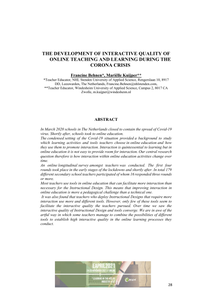Blended learning offers a learner-centred approach that employs both in-class learning and digital technology to facilitate online learning. Such an approach is especially advantageous to adult-learners in higher education as it meets their educational needs. However, adult-learners’ participation in blended learning programmes remains challenging due to a general lack of online interaction, and no clear teaching strategies that address this concern. Literature relating to adult-learners’ educational needs and online interaction was consulted in order to design teaching strategies that foster adult-learners’ online interaction. The aim of this study is to further validate these teaching strategies, hence a multiple case study was carried out using a mixed method approach. As such, eight teachers and sixteen students from four courses across three universities in Belgium and the Netherlands were interviewed. Additionally, a questionnaire testing a pre-defined set of variables was distributed to 84 students. The results lead to a set of validated teaching strategies that help teachers to further develop their professional skills and expertise. The teaching strategies can be grouped into three categories, namely 1) the teacher's online presence, 2) collaborative learning activities and preparatory learning activities, and 3) the distribution of learning content and learning activities across online and in-class learning. An elaborate set of validated teaching strategies is included. This study aids towards teacher professional development and adds evidence-based knowledge to teaching strategies and instructional frameworks for adult-learners in higher education.
LINK
In March 2020 schools in The Netherlands closed to contain the spread of Covid-19 virus. Shortly after, schools took to online education. The condensed setting of the Covid-19 situation provided a background to study which learning activities and tools teachers choose in online education and how they use them to promote interaction. Interaction is quintessential to learning but in online education it is not easy to provide room for interaction. Our central research question therefore is how interaction within online education activities change over time. An online longitudinal survey amongst teachers was conducted. The first four rounds took place in the early stages of the lockdowns and shortly after. In total 179 different secondary school teachers participated of whom 16 responded three rounds or more. Most teachers use tools in online education that can facilitate more interaction than necessary for the Instructional Design. This means that improving interaction in online education is more a pedagogical challenge than a technical one. It was also found that teachers who deploy Instructional Designs that require more interaction use more and different tools. However, only few of these tools seem to facilitate the interactive quality the teachers pursued. Over time we saw the interactive quality of Instructional Design and tools converge. We are in awe of the artful way in which some teachers manage to combine the possibilities of different tools to establish high interactive quality in the online learning processes they conduct.
DOCUMENT

Context When the pandemic hit the world, teachers were forced to change their education from onsite to virtual overnight Understandably, teaching quality decreased in the beginning, as there was little experience in how to adapt the educational design Zuyd University of Applied Sciences ( recognized the problem that teachers were on different didactic and pedagogical levels when it comes to online education Unfortunately, the pandemic made it hard for teachers to connect with each other In the Domain of Health and Welfare, this led to the idea of establishing a professional learning community A professional learning community ( can be seen as an informal group of people who share knowledge and experiences among each other on a common topic they are all highly interested in Zuyd’s vision “passion for development” sets a good basis for the start of such a community. Steps we took In order to find out how a professional learning community can look like in Zuyd, the following steps were taken Firstly, we collected and evaluated literature and best practices around the topic Based on our findings we developed an interview guideline and conducted interviews with eight teachers from the Domain of Health and Welfare Throughout the whole report a SWOT analysis was performed with the literature and best practices filling opportunities and threats and the interviews providing content for strengths and weaknesses Main findings From these sources, we derived enablers for a successful learning community, which led to recommendations for Zuyd on how to strategically position, implement and organize a PLC One of our major recommendations is to make didactic and pedagogical skills an important topic within Zuyd in order to strategically implement the learning community into Zuyd’s strategy Furthermore, we recommend giving the lead in organizing and facilitating the PLC to the blended learning task force To collect a diverse set of interested employees to the core group, the educational managers should personally approach teachers that might be interested The sense of urgency around the topic needs to be addressed regularly through the directors of the Domain, the task force of blended learning, as well as the PLC itself In this way, interest in the topic of didactic and pedagogical skills and blended learning can be enhanced In the report we go into greater detail on how to organize and apply these recommendations. We are convinced that implementing these steps will pay off in the future and will successfully enhance competencies on blended learning and didactic and pedagogical skills through knowledge exchange.
DOCUMENT
